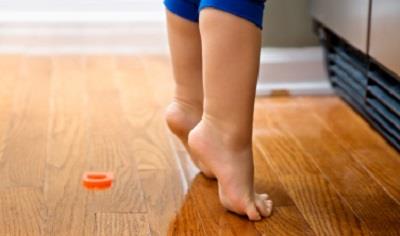Have you noticed that babies often go on tiptoes? This can be a non-dangerous spontaneous habit, it can also be caused by a tendon problem or more serious neurological abnormalities such as cerebral palsy.
Signs your child has tiptoe problems
Most babies sometimes go on tiptoes when playing, for example, in games that require little movement, they will grab onto furniture and move with their heads. toe. Some babies also like to tiptoe back and forth because it feels different and interesting. In general, tiptoeing is not a problem for babies under 2 years of age and will often not become a permanent habit.
However, if your baby has some of the following signs, parents should take the baby to the doctor to be checked:
Almost with the tips of the toes
Tense muscles
Lack of coordination between the limbs
Walk awkwardly, often stumble or waddle
There is an abnormality in the development of motor skills, such as the inability to button her shirt
Standing unsteady when walking barefoot
Loss of existing motor skills

Tiptoes can indicate a number of physical problems, including cerebral palsy
Causes of a baby tiptoe problem
If your baby is always on tiptoes, he or she may have physical problems such as a congenital achilles tendon, a little short heel tendon so keep moving. is tiptoe. This will prevent your baby from standing upright on his feet and limit the amount of movement in his ankles. In addition, tiptoes can be a sign of a motor disorder, a condition of cerebral palsy.
There are several types of cerebral palsy and the most common is spastic cerebral palsy, meaning that the limbs are spastic and have difficulty moving. Babies born prematurely have a higher risk of cerebral palsy than term babies due to premature birth may bleed in the brain, causing damage to the parts that control brain activity. Sometimes an infection from the mother or fetus during the mother's pregnancy damages brain tissue and leads to cerebral palsy. Sometimes a premature baby develops a condition called periventricular white chemical molluscum that damages the nerves that control movement.
A baby tiptoeing can also be caused by hemiplegia, a form of cerebral palsy in which his Achilles tendons are very tight, the heels are pulled up and the toes point down. If the cause of your baby's tiptoes is due to brain damage, the condition often comes with language skills delay and autism. So, if your baby has these problems at the same time, you should take him to the doctor to check.
If the doctor determines that your baby does not have cerebral palsy, autism and other neurological problems, and his muscle tone and ankle mobility are good, he can be diagnosed with a walking condition. spontaneous tiptoes. This means that the cause cannot be determined and the baby's tiptoes are just out of habit.
Solution treating her to tiptoe
Viiec chanquen baby to equinus. cerebral palsy, autism, and other neurological problems, and good muscle tone and ankle mobility, the baby can be diagnosed with a low heel due to her tiptoeing. cerebral palsy, autism and other neurological problems, as well as muscle tone and ability to swing when the baby is on tiptoes.
If your baby has a physical problem, such as the short Achilles tendon, treatment can start with physical therapy which includes stretching. The doctor will have your baby wear an ankle or foot orthotic, this is a lightweight plastic support that hugs the back of the leg and holds the foot at a 90 degree angle. Your baby will need to wear it all day and night until tiptoe is gone. Of course, you can take it off when you bathe your baby or when your baby is practicing reinforcement exercises. In rare cases, surgery may be needed to improve the situation.
If the root cause of tiptoes is due to cerebral palsy or autism rather than a physical problem, therapies will help improve the underlying factors. In that case, the first step in determining the type of treatment your baby needs is to reassess your baby's development.












